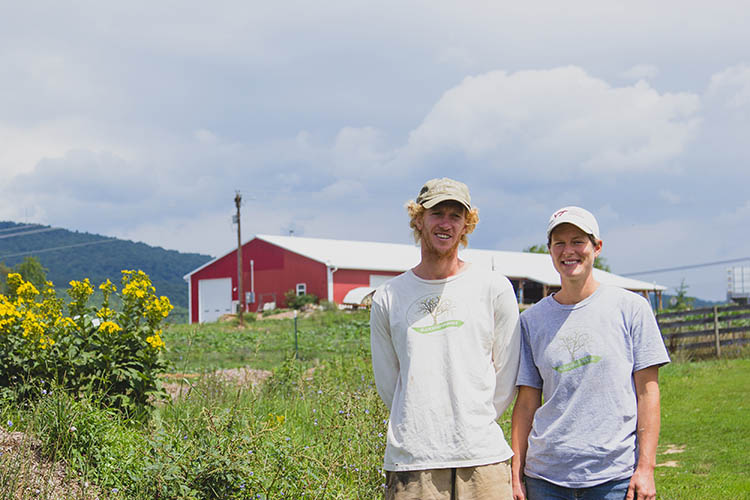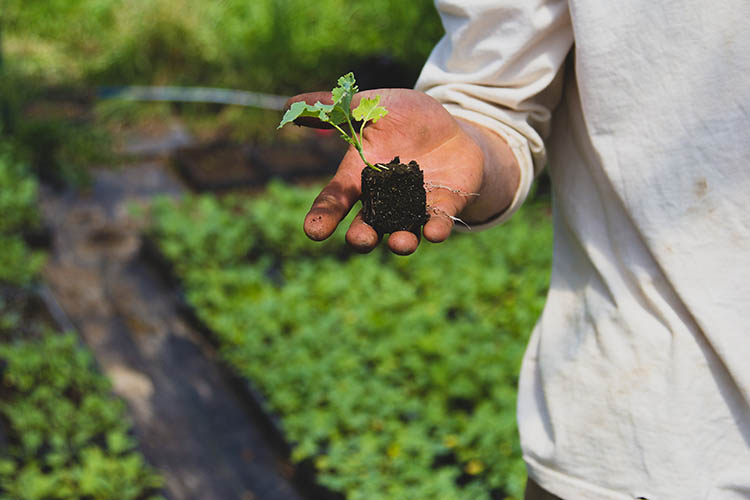Local farm becomes a launch pad for entrepreneurs
In the five years since Jason “JP” Pall and Sally Walker began growing produce on a hilly, windswept plot not far from Virginia Tech, they’ve watched several of the parcels surrounding them change hands. A few have been transformed from pastures — the undulating terrain here is good for little more than grazing cattle — into new homes.

In fact, developer Patrick Bixler owns the 48-acre property that’s home to Pall and Walker’s farm, Glade Road Growing, located within Blacksburg town limits. Bixler had intended for houses to be built on his land — until he met the pair of young farmers and decided to give something else a shot.
What’s growing on the parcel now, though it does include some new construction, is more than the landowner could have imagined.
The parcel that had been leased to one farmer for grazing cattle is now home to more than a half-dozen farm-related and other businesses, many of them offshoots from Pall and Walker’s thriving vegetable- and poultry-growing operation. There’s a tenant who raises pigs and another who keeps goats, a pair of cooks that cater, a woodworker who builds tables, a mechanic and a solar panel business.
“I don’t take credit for dreaming it up, but it makes a lot of sense when you see it,” Bixler said of the way the likeminded tenants have layered multiple uses on the landscape. “If you just say, ‘I’ve got 48 acres. I’m looking for somebody to run cattle.’ That’s about as boring as it gets.”
Pall and Walker, both 31, are reluctant to call what they’ve helped create here a “business incubator,” but that’s basically what it is. Their experience has attracted others interested in starting their own ventures, many of them food-based, and a unique support system here is helping many of them get off the ground.
“We encourage our employees to do their own thing for a side income while they’re here. They’ve all done it,” JP said. “We’re just giving them some income while they get themselves up and running.”

“Our landowner didn’t say, ‘I want a small business incubator,’” Sally said. “It kind of fell into that through the networking and the people that we attract.”
At one end of the expansive pole barn that houses most of the businesses, a former employee is buzzing through sustainably harvested wood, turning it into artisanal furniture that he now sells full-time. By mid-morning, several others are coming and going, perhaps putting in a few hours at the mechanic shop or picking vegetables.
A brick oven that can bake up to 30 loaves of bread at a time — and enough pizzas to feed a sizable farm tour — recently took shape at the barn’s other end. Garum, a baker/pizza business runs the brick oven on the farm, and it’s often used by Fare Palate, a hot plate stand that sells at the local farmers market. Its owners will also share a commercial kitchen that’s currently under construction in a side room with the other tenants.
In the early afternoon, several of the workers gather around one of the handcrafted kitchen tables for a farm-to-table-style lunch that rivals that of any restaurant. The meal features a duck-egg frittata, as brilliant in color as the sun-ripened tomatoes, with homemade mayo and pickles on leftover, oven-fired bread.
“It turns out that everyone who works here is a fabulous cook,” JP said.
The decision to lease
After they both graduated from Virginia Tech, JP worked for a year at the university running its onsite farm, which provided a couple of acres of produce to the school dining hall. Sally continued with graduate school, and the couple began looking for land “to start our own farm.”
With some cash saved up from renovating and selling a house, Pall and Walker began looking for farm properties they could purchase within 45 minutes of Blacksburg, where they wanted to sell produce directly to customers.
“But all the land that we could have afforded didn’t look like it would be very good to farm,” Sally said.
“Then we were stuck with two choices,” JP said. “We could buy an acre of land way out on the top of a mountain, or we could put that money into our farm infrastructure.”
He now supports the agricultural uses of his family-owned land so much that he’s putting it into a conservation easement to prevent future development.
Pall and Walker soon met Bixler and began the process of leasing land from him. Bixler said the idea of leasing to the young entrepreneurs appealed to his sensitivities, if not his bottom line at first.
“They really convinced me that they were dedicated to doing it right. They weren’t just biding their time before they moved on to the next adventure,” said Bixler. He now supports the agricultural uses of his family-owned land so much that he’s putting it into a conservation easement to prevent future development.
And, last year, after a neighbor Sally and JP had gotten to know acquired “this flat piece of land close to the farm,” Sally said, they entered into a lease with her to farm those three acres as well.
Elisabeth Swindell lives on the adjacent property that her mother, Danielle Wattel, owns, and already had a habit of bringing her three children by the farm to volunteer or pick vegetables.
“I don’t think we would have done it with just anyone,” Swindell said of the lease. “We know them, we like them and we know they have a good work ethic, so we jumped on it.”
Though leasing land inside town limits is more expensive, it also comes with some perks.
JP takes advantage of what he calls “wasted resources” like wood chips, leaf mulch and other compostable materials that the town hauls away from peoples’ lawns. The town delivers the materials for free to the farm, where Pall and Walker put them to use as soil-building compost in their vegetable beds and in between the rows in their burgeoning orchard.
“Before we got started, we knew the leaves and wood chips were available in town but not outside of town. That’s one of the trade-offs between owning land outside of town and leasing land here,” JP said.
The farm’s location also keeps them close to customers, who, as of this season, can buy produce directly from a farm stand on Friday afternoons. Glade Road Growing also has more than 100 members in its CSA and sells at the Blacksburg Farmers Market twice a week.
“We’re in town, so we tell our customers that they can come see our farm if they want to,” Sally said. “You can’t do that if your farm is 45 minutes away.”

Creating Synergy
The various businesses based at the farm have such symbiotic relationships that the lines between them sometimes blur. Pall and Walker serve as a sort of anchor tenant for the facility and the land, though they farm vegetables with organic methods on fewer than seven of the total 48 acres.
Each tenant works out his or her own rent with the landowner, often starting out with a reduced rate and building up to what is affordable as the business grows. Pall and Walker had a similar arrangement during their first two years on the property, exchanging manual labor (planting trees and repairing old barns) as rent while getting their farm business off the ground.
“But as the farm business grew, we had less time for maintenance and more money for rent, so it switched over to a money rent,” Sally said.
The couple now pays a flat $750 a month to Bixler, though the number of acres they’re cultivating or using for animals at any given time fluctuates.
Each tenant works out his or her own rent with the landowner, often starting out with a reduced rate and building up to what is affordable as the business grows.
Pall and Walker don’t sublease to any of the other tenants, but they do coordinate with all of them, especially when it comes to rotating animals through the property’s pastures. Their chickens, turkeys and ducks now rotate through the pastures following the cows that are part of the original tenant’s cow-calf operation.
Pall and Walker also coordinated with the state cost-share program to get funding to fence the cattle out of the property’s streams, helping add important infrastructure to the property while simultaneously ensuring the property was more environmentally friendly.
As part of their lease, Bixler pays for any permanent infrastructure that stays with the property — from additions inside the pole barn to the 150 apple trees that were recently planted for Pall and Walker’s farm — and welcomes new tenants whose rent helps him earn a good return on those investments.
That works well for Pall and Walker, too.
“This investment is what we wanted,” JP said of new infrastructure that’s filled the main barn. “We want to sell from the farm as much as possible. That’s a major advantage of being this close to town.”
Listening to JP talk about all that is going on at the farm you have to think that perhaps the greatest investment isn’t the infrastructure but the creative energy that JP and Sally have brought to the farm. When you start thinking about all of the good farm land and creative people we have in the region you just have to get excited thinking about all the posibilities.
This story is part of “Finding a Place to Grow“, a publication produced by The Piedmont Environmental Council. The stories were written by Whitney Pipkin, a freelance journalist from Alexandria, VA who covers food, farms, and the environment. Her work appears in the Washington Post, Virginia Living and the Chesapeake Bay Journal, among others, and she writes at thinkabouteat.com. Photos were taken by Jami McDowell.
The publication was made possible by a grant from The Beirne Carter Foundation.
